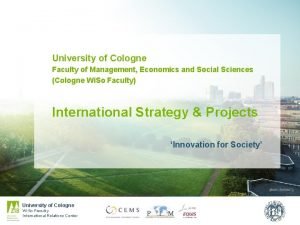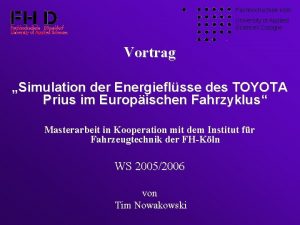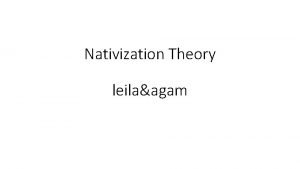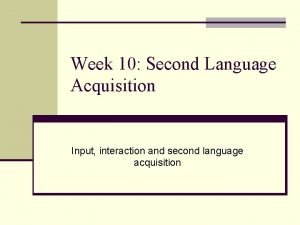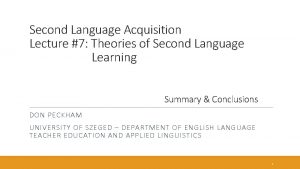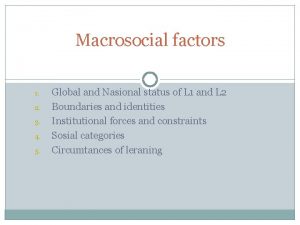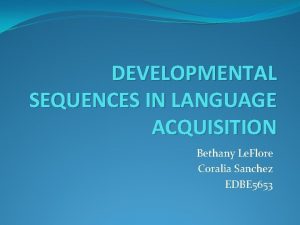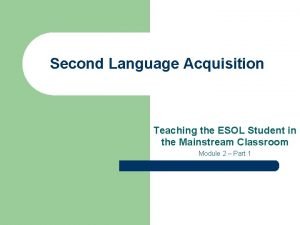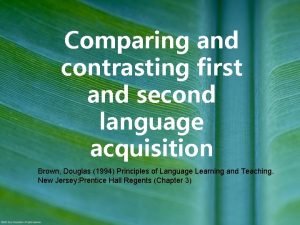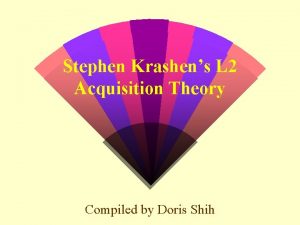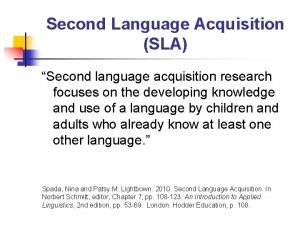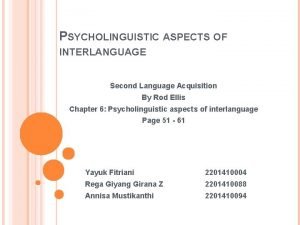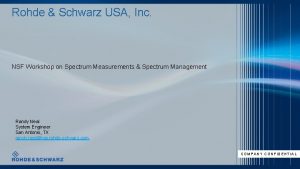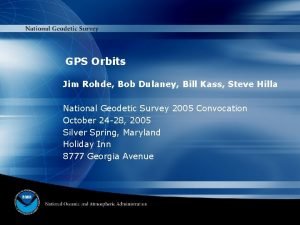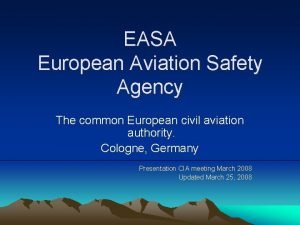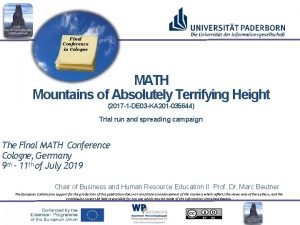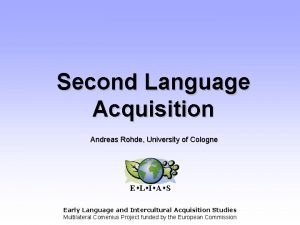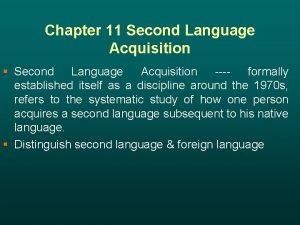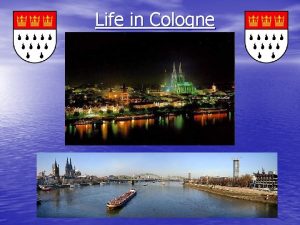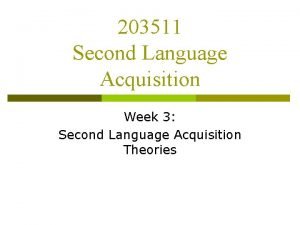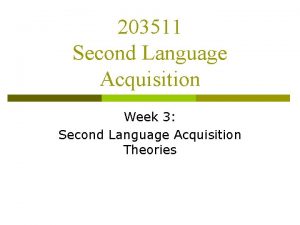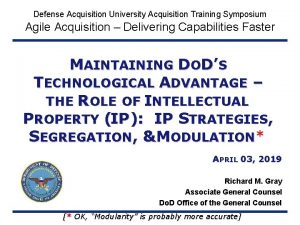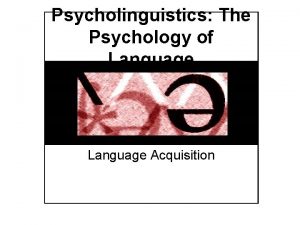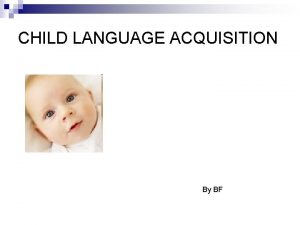Second Language Acquisition Andreas Rohde University of Cologne



























- Slides: 27

Second Language Acquisition Andreas Rohde (University of Cologne) E L I A S Early Language and Intercultural Acquisition Studies Multilateral Comenius Project funded by the European Commission

Introduction E L I A S • Monolingualism is an exception in human cultures and expecially in Europe it is primarily a phenomenon associated with the nation states. • Until the 1960 s even some linguists considered bilingualism as harmful. • The common belief was that two languages have to share the same space in the human brain which is usually assigned to one language, the "native“ language. Andreas Name of Rohde Author/s Second Language Acquisition © Early Language and Intercultural Acquisition Studies

Introduction E L I A S • For the average lay person, this idea has not changed considerably. One oftenheard statement still is: "They should first learn their native language appropriately before learning another one. " Andreas Name of Rohde Author/s Second Language Acquisition © Early Language and Intercultural Acquisition Studies

Outline E L I A S 1. Language acquisition: what is acquired? 2. What is second language acquisition? 3. L 2 -acquisition theories 4. Developmental stages 5. Input – Interaction – Output 6. Language acquisition in preschools Andreas Name of Rohde Author/s Second Language Acquisition © Early Language and Intercultural Acquisition Studies

1. What is Acquired? E L I A S • Two definitions of language: Ø Language as a system of structures and rules Ø Language as a means of communication • This distinction can also be found in foreign language classrooms: Ø "Learning English to use it" (system) Ø "Using English to learn it" (communication) Andreas Name of Rohde Author/s Second Language Acquisition © Early Language and Intercultural Acquisition Studies

2. What is L 2 Acquisition? E L I A S • Second language: language is the ambient language. • Foreign language: language is not the ambient language. • The bilingual preschool is a special case: In a German/English preschool in Germany, English is also the ambient language, at least for a considerable time of the day. Andreas Name of Rohde Author/s Second Language Acquisition © Early Language and Intercultural Acquisition Studies

2. What is L 2 Acquisition? E L I A S Variety of L 2 -acquisition contexts Ø 3 -year old child at a bilingual preschool Ø 3 -year old child in an English speaking country Ø 45 -year old adult in an English speaking country Ø 8 -year old child in a classroom setting Ø 60 -year old in an adult education programme Andreas Name of Rohde Author/s Second Language Acquisition © Early Language and Intercultural Acquisition Studies

2. What is L 2 Acquisition? E L I A S • L 2 -acquisition vs. bilingual L 1 -acquisition Central research questions concern e. g. Ø the “ideal/optimal age” for learning an L 2 Ø neurolinguistic correlations Problem Ø Until now it is still uncertain which factors really are influenced by our biological age. Ø Interpretation of neurolinguistic data Andreas Name of Rohde Author/s Second Language Acquisition © Early Language and Intercultural Acquisition Studies

3. L 2 Acquisition Theories E L I A S • Until the 1970 s especially L 2 -Acquisition was considered a process of imitation in which linguistic structures were learned by heart and reproduced. "Pattern drill" was seen as the most successful procedure to learn another language effectively. Andreas Name of Rohde Author/s Second Language Acquisition © Early Language and Intercultural Acquisition Studies

3. L 2 Acquisition Theories E L I A S Examples "Mama, hab‘ das angestreichen. " "She camed home. " "She always do that. " "Ich glaub‘, das Futter ist erwachsen. “ (I think the food is grownup. ) Andreas Name of Rohde Author/s Second Language Acquisition © Early Language and Intercultural Acquisition Studies

3. L 2 Acquisition Theories E L I A S • Today we consider language learning as a process of construction. Learners go through linguistic developmental stages and learning takes place gradually / progressively. Learners thus NEED TO MAKE ERRORS as no structure can be mastered a priori. Andreas Name of Rohde Author/s Second Language Acquisition © Early Language and Intercultural Acquisition Studies

3. L 2 Acquisition Theories E L I A S Ø Genetic approach Universal Grammar Basic linguistics knowledge is innate. Ø Socio-cultural approach Input – Interaction – Output Language acquisition takes place whithin social activities and ritualised situations. Andreas Name of Rohde Author/s Second Language Acquisition © Early Language and Intercultural Acquisition Studies

4. Developmental Stages E L I A S St Phenomenon Examples 1 Words Formulas hello, super, blue, book How are you? Where is x? 2 Negation SVO -ed -ing Me no live here. Me drink cola. John played. Jane going. 3 Do-fronting Auxiliar-fronting Object (Pronouns) Do he live here? Can I go home? Mary called him. 4 Kopula-fronting Wh-fronting Is he at home? Where is he? 5 Negation 2. place Auxiliary 2. place 3. person sg. –s Why didn't you tell me? Why did she eat that? Peter likes beer. 6 Indirect questions I wonder what she wants. (after Pienemann 1998) Andreas Name of Rohde Author/s Second Language Acquisition © Early Language and Intercultural Acquisition Studies

4. Developmental Stages E L I A S • Developmental stages are an integral part of every acquisition process including foreign/second language acquisition. • Linguistic structures need to be (re)constructed. • Because of the fact that language acquisition involves a hierarchical construction of linguistic structures, imitation itself cannot lead to acquisition. Andreas Name of Rohde Author/s Second Language Acquisition © Early Language and Intercultural Acquisition Studies

5. Input – Interaction – Output E L I A S • Rich and comprehensible Input (Stephen Krashen): listening comprehension • Interaction promotes learning (Michael Long): negotiation of meaning • Output: "noticing" / the learner has to test hypotheses (Merrill Swain) Andreas Name of Rohde Author/s Second Language Acquisition © Early Language and Intercultural Acquisition Studies

5. Input – Interaction – Output E L I A S • In a "normal" (desirable) L 1 -context all three components, input, interaction and output, are equally distributed. In formal L 2 acquisition/learning, however, such a balanced situation is not given, it has to be artificially created. Andreas Name of Rohde Author/s Second Language Acquisition © Early Language and Intercultural Acquisition Studies

5. Input – Interaction – Output E L I A S • Without interaction language learning is not possible. • E. g. "foreign language television" – a language cannot be learned solely by watching movies in another language as the input cannot be negotiated in any way. Andreas Name of Rohde Author/s Second Language Acquisition © Early Language and Intercultural Acquisition Studies

5. Input – Interaction – Output E L I A S C Ich wusste nicht, dass du heute kommst. (I didn‘t know you were coming in today. ) S I come every Monday. C Was ist "Monday"? (What is "Monday"? ) S Monday, Tuesday, Wednesday. . . C Du meinst die Tage. (You mean the days). S Yes and today is Monday. C Ach ja, heute ist ja Montag. (Oh yes, it‘s Monday today). Andreas Name of Rohde Author/s Second Language Acquisition © Early Language and Intercultural Acquisition Studies

5. Input – Interaction – Output E L I A S • Without producing output themselves learners do not become aware of their deficits and certain linguistic regularities are not detected. Andreas Name of Rohde Author/s Second Language Acquisition © Early Language and Intercultural Acquisition Studies

6. L 2 Acquisition in Preschools E L I A S • Why should children learn English as early as preschool? • The children‘s potential for learning is immense and never used to full capacity. • BUT: Realistic expectations as to the expected language proficiency are of great importance. Andreas Name of Rohde Author/s Second Language Acquisition © Early Language and Intercultural Acquisition Studies

6. L 2 Acquisition in Preschools E L I A S • Language is often accompanied by a context or situation which is familiar to the children and thus makes language learning a secondary task in the begining. Andreas Name of Rohde Author/s Second Language Acquisition © Early Language and Intercultural Acquisition Studies

6. L 2 Acquisition in Preschools E L I A S • The understanding of situations gradually enables the children to comprehend the acompanying language. Andreas Name of Rohde Author/s Second Language Acquisition © Early Language and Intercultural Acquisition Studies

6. L 2 Acquisition in Preschools E L I A S • At first the children do not need to understand what the preschool teacher says but what he/she MEANS. Andreas Name of Rohde Author/s Second Language Acquisition © Early Language and Intercultural Acquisition Studies

6. L 2 Acquisition in Preschools E L I A S • Children learn a new language without any effort in authentic and familiar situations. Primary schools cannot afford this kind of "luxury". Andreas Name of Rohde Author/s Second Language Acquisition © Early Language and Intercultural Acquisition Studies

Conclusions E L I A S • Language acquisition is a time-consuming process of construction. However, input, interaction and output are equally warranted. • In L 2 acquisition these three components are not necessarily given, especially not in a school situation. Andreas Name of Rohde Author/s Second Language Acquisition © Early Language and Intercultural Acquisition Studies

Conclusions E L I A S • A preschool, however, offers remarkably good conditions for second language acquisition as there is ample time and the children act in natural situations which do not need to be arranged. Andreas Name of Rohde Author/s Second Language Acquisition © Early Language and Intercultural Acquisition Studies

E L I A S www. elias. bilikita. org The ELIAS project has been funded with support from the European Commission. Disclaimer: This product reflects the views only of the author, and the Commission cannot be held responsible for any use which may be made of the information contained therein. Andreas Rohde Second Language Acquisition © Early Language and Intercultural Acquisition Studies
 Language acquisition vs language learning
Language acquisition vs language learning Andreas rohde uni köln
Andreas rohde uni köln University of cologne faculty of management
University of cologne faculty of management University of applied sciences cologne
University of applied sciences cologne What is nativization model
What is nativization model Language
Language Language
Language 7 theories of second language acquisition
7 theories of second language acquisition Macrosocial factors in second language acquisition
Macrosocial factors in second language acquisition Developmental sequence linguistics
Developmental sequence linguistics роберт ладо
роберт ладо Krashen vs cummins
Krashen vs cummins Contrasting acquisition
Contrasting acquisition Krashens monitor model
Krashens monitor model Second language acquisition
Second language acquisition Is language
Is language Psycholinguistic aspects of interlanguage
Psycholinguistic aspects of interlanguage Rohde & schwarz nrp z81
Rohde & schwarz nrp z81 Rohde & schwarz fswp8
Rohde & schwarz fswp8 Rohde & schwarz usa, inc.
Rohde & schwarz usa, inc. Perfume presentation
Perfume presentation Richard dulaney
Richard dulaney Aviation friends cologne
Aviation friends cologne Cologne
Cologne Celebrating dr. ildaura murillo-rohde
Celebrating dr. ildaura murillo-rohde Cologne marketing conference
Cologne marketing conference Living in cologne
Living in cologne Cologne mountains
Cologne mountains


